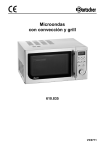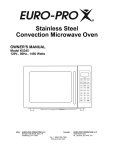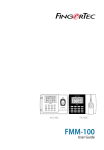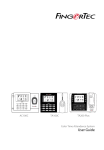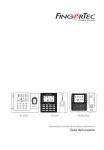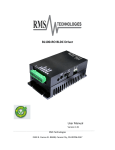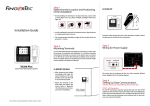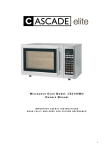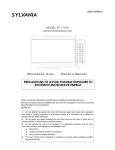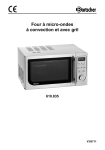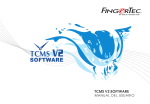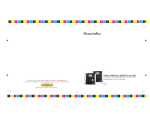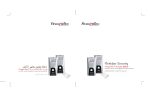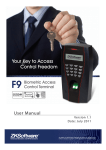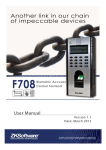Download USER MANUAL
Transcript
TA100C TA100TC Q2i/TA200Plus i-Kiosk 100 USER MANUAL Color Multimedia Fingerprint Time Attendance & Access Control System COPYRIGHT NOTICE All rights reserved. No part of this book may be reproduced or transmitted in any form or by any means, electronic or mechanical, including photocopying, recording, or by any information storage and retrieval system, without written permission from FingerTec Worldwide Sdn Bhd. Every precaution has been made to supply complete and accurate information. Information in this document is subject to change without prior notice. DISCLAIMER No person should rely on the contents of this publication without first obtaining advice from a qualified professional person. The company expressly disclaims all and any liability and responsibility to any terminal or user of this book, in respect of anything, and of the consequences of anything, done by any such person in reliance, whether wholly or partially, upon the whole or any part of the contents of this book. FINGERTEC WORLDWIDE SDN BHD For enquiries on technical matters, please forward the email to [email protected] CONTENTS 1 •GETTING STARTED IMPORTANT SAFEGUARDS INTRODUCTION TO Terminal Complete Package Materials Provided Basic Features 2 •USING THE FINGERPRINT TerminaL 11-23 USING THE FINGERPRINT Terminal TIPS FOR BEST FINGERPRINT ENROLLMENT INITIAL SET UP OF THE FINGERPRINT Terminal Date/Time Adjustment Enrollment Enrollment of Supervisor/Administrator Enrollment of Normal User Fingerprint Verification Password Enrollment Password Verification Deleting Users 3 • RFID card function 3-10 24-26 RFID card verification with rfid card 4 • access options 27-43 5 •Other useful functions 44-57 BRIEF INTRODUCTION TO ACCESS OPTIONS Functions description Definition of time zone DEFINITION OF GROUPING FUNCTION DEFINITION OF USER ACCESS SETTINGS Definition of Holiday Settings User Unlock Combination settings Access control Parameters Duress alarm parameters To define duress fingerprint USB pen drive Work Codes System Options Auto Test Record System Info Short message display T9 Input Method 6 •INSTALLATION & COMMUNICATIONS 58-69 Connections Available Power Supply Connection Communication Connection security APPENDIX • TROUBLESHOOTING 70 1 •GETTING STARTED IMPORTANT SAFEGUARDS Installation Location INTRODUCTION TO terminal TA100C Series Do not install terminal in areas which are exposed to bright sunlight or rain, as the fingerprint readers are not designed to work in those areas. Bright light will interfere with reading of the sensor and fingerprint readers are not waterproof or vandal proof. It is recommended to protect your fingerprint terminal with enclosure. Go to http://accessory.fingertec.com to view the enclosure and other accessories. TA100C Use of Sensor Do not abuse the fingerprint sensor by scratching the surface, contacting the sensor’s surface with heat, pressing hard during placement of fingerprint for verification. Clean the sensor occasionally with cellophane tape to maintain the performance of the sensor. TA100TC A fingerprint verification terminal is designed to record time and attendance by using biometrics trait, fingerprint. It is to replace the conventional punch card system as well as other card systems for time & attendance function. The fingerprint terminals are capable of recognizing the recorded fingerprint templates in seconds and therefore, have been successful in eliminating buddy-punching activity, one of the major problems in human resource management. TA100C Series terminals are able to store fingerprint templates from 1,500 for TA102C to 2,800 for TA103C depending on the series chosen. It is also able to record from 100,000 transactions with TA102C and 120,000 transactions with TA103C, at any given time and those transactions can be downloaded and cleared up using the management software TCMS V2. TA100C Series also offers TA103C-R, fingerprint time & attendance system with RFID card function, TA100TC- touch screen system with card function and TA100TC-R, color multimedia system with card function. CONTENTS Q2i/TA200 Plus i-Kiosk 100 The Q2i / TA200 Plus is the revolutionary product of time attendance and door access, designed with colored screen TFT display for vivid color presentation. The i-Kiosk 100 is the revolutionary product of time attendance and door access, designed with colored screen TFT display for vivid color presentation. Storage capacity of Q2i / TA200 Plus is 3000 fingerprint templates and 120000 transaction logs, and it offers multiple methods of verification which include fingerprint, password and RFID card for user convenience. Q2i / TA200 Plus understands the needs of today’s working environment which requires multitasking. Fingerprint enrolment of every user shall be done once and these templates are downloadable into TCMS V2 software for backup and they are transferable to other terminal for verification. Every time a registered user gets verified at the readers, date and time of the transaction is stored as a transaction log. These logs can be downloaded into TCMS V2 software for reports and further analysis. Download process can be done via TCP/IP connection, USB flash disk (pen drive), RS232 connection, or RS485 connection. CONTENTS Storage capacity of i-Kiosk 100 is 3000 fingerprint templates and 120000 transaction logs, and it offers multiple methods of verification which include fingerprint, password and RFID card for user convenience. i-Kiosk 100 understands the needs of today’s working environment which requires multitasking. Fingerprint enrollment of every user shall be done once and these templates are downloadable into software for backup and they are transferable to other readers for verification. Every time a registered user gets verified at the terminal, date and time of the transaction is stored as a transaction log. These logs can be downloaded into software for reports and further analysis. Download process can be done via TCP/IP connection, USB flash disk (pen drive), RS232 connection, or RS485 connection. SPECIFICATION Model Display area (inch) TA100C TA100TC Q2i/TA200 Plus 3.0 TFT screen i-Kiosk 100 3.5 TFT screen Color resolution 65k Surface finishing Acrylonitrile Butadiene Styrene (ABS) Fp Storage 1500 3000 Transaction log 50000 120000 Connection available TCP/IP, RS232, RS485, USB flash disk, USB host-client Card terminal Sensor Terminal default language *Optional language TCP/IP, RS232, RS485, USB flash disk, USB host-client, Wiegand 26-bits input/output RFID card terminal (default) Optical scanner English Arabic / Indonesian / Spanish / Chinese Simplified / Chinese Traditional / French /German / Malay / Russian / Farsi / Portuguese / Thai / Italian / Vietnamese / Turkish CONTENTS Complete Package TA100C Series Q2i/TA200 Plus 2 1 i-Kiosk 100 2 1 2 1 4 3 3 3 5 5 6 6 4 5 6 4 7 7 7 8 1 • Fingerprint Terminal 2 • Software & Video Guide CD 3 • USB Extension 4 • A Packet of Bolts 5 • DC 5V Power Adapter 6 • Siren Cable 7 • Screwdriver 8 • Cable Protector CONTENTS 8 1 • Fingerprint Terminal 2 • Software & Video Guide CD 3 • USB Extension 4 • A Packet of Bolts 5 • DC 12V Power Adapter 6 • TCP/IP Connector Jack 7 • Screwdriver 8 • RFID Card (5pcs) 9 • Wire Connector 9 8 1 • Fingerprint Terminal 2 • Software & Video Guide CD 3 • USB Extension 4 • A Packet of Bolts 5 • DC 12V Power Adapter 6 • TCP/IP Connector Jack 7 • Screwdriver 8 • RFID Card (5pcs) 9 • Wire Connector 9 Materials Provided • Quick Start Guide • Hardware User Manual • Software User Manual • Video Guide for Software and Hardware • Sample of Enrollment Form Basic Features TA100C Series TA100C L.E.D Display The L.E.D display has two lights. Green - The terminal is in standby mode or to indicate that user has been successfully verified. Red - To indicate that user verification has failed. Color LCD Speaker Screen that displays instruction and status of terminal. To prompt user with result of verification and information. Optical Scanner NOTE For user to place finger for enrollment or verification. KeypadS USB port for data transfer USB PORT Keys from 0-9, alphabets Power on/off button, Escape/Cancel button, Menu/Enter button, backspace button, left button, right button. Escape/Cancel Scroll Up /Check-In Scroll Down / Check-Out Menu / OK To upload/download user information, password, fingerprints and transaction logs via USB flash disk. Left Right CONTENTS TA100C Series TA100TC L.E.D Display The L.E.D display has two lights. Green - The terminal is in standby mode or to indicate that user has been successfully verified. Red - To indicate that user verification has failed. Color LCD Speaker Screen that displays instruction and status of terminal. To prompt user with result of verification and information. Optical Scanner NOTE For user to place finger for enrollment or verification. KeypadS USB port for data transfer USB PORT Keys from 0-9, alphabets Power on/off button, Escape/Cancel button, Menu/Enter button, backspace button, left button, right button. Escape/Cancel Scroll Up /Check-In Scroll Down /Check-Out Menu / OK To upload/download user information, password, fingerprints and transaction logs via USB flash disk. Left CONTENTS Right Q2i/TA200 Plus L.E.D Display The L.E.D display has two lights. Green - The reader is in standby mode or to indicate that user has been successfully verified. Red - To indicate that user verification has failed. Color LCD Screen that displays instruction and status of terminal. Optical Scanner For user to place finger for enrollment or verification. Function Keys Shortcut keys to enter specific command to terminal. Navigation Keys To navigate and to input command to terminal. NOTE USB PORT To upload/download users information, password, fingerprints and transaction logs via USB flash disk. Speaker CARD USB port for data transfer RFID card induction area. KeypadS To prompt user with result of verification and information. Escape Keys from 0-9, alphabets Power on/off button, Escape/Cancel button, Menu/Enter button, backspace button, asterisk (*) button, hash (#) button. Menu/Enter Backspace Power On/Off Asterisk Hash CONTENTS i-Kiosk 100 Color LCD L.E.D Display The L.E.D display has two lights. Green - The terminal is in standby mode or to indicate that user has been successfully verified. Red - To indicate that user verification has failed. NOTE Function Keys Shortcut keys to enter specific command to reader. RFID CARD RFID card induction area. USB port for data transfer USB Port To upload/download users information, password, fingerprints and transaction logs via USB flash disk. 10 CONTENTS KeypadS Keys from 0-9, alphabets Power on/off button, Escape/Cancel button, Menu/ Enter button, backspace button, asterisk (*) button, hash (#) button. Screen that displays instruction and status of terminal. Navigation Keys To navigate and to input command to reader. Speaker To prompt user with result of verification and information. Optical Scanner For user to place finger for enrollment or verification. Asterisk | Hash Menu/Enter | Escape Backspace | Power On/Of 2 •using the fingerprint terminal USING THE FINGERPRINT Terminal This chapter will guide on how to use the fingerprint terminal effectively. To get a good reading every time, initial fingerprint enrollment must be done properly. The fingerprint terminal provides 4 types of enrollment method: 1 Fingerprint Enrollment 2 Password Enrollment 3 Fingerprint and Password Enrollment 4 User enrolls his fingerprint template into a terminal and the template will be used for future verifications. For user who has difficulty to enroll fingerprint due to poor fingerprint quality, enrollment of password is recommended. Password enrollment is also suitable for visitors and temporary workers. Under this option, a user can enroll both fingerprint and password at the same time. The user can either use fingerprint or password to report attendance or to gain access. RFID CARD ENROLLMENT Please refer to Chapter 3 for RFID Card Function. Center points CONTENTS 11 TIPS FOR BEST FINGERPRINT ENROLLMENT What you should DO Place finger flat on the fingerprint sensor. Make sure the finger’s midpoint is placed at the center of the fingerprint sensor. 1 Use INDEX finger 2 Make sure the finger is not wet, too dry, injured or dirty Index finger is smaller than thumb and it can be comfortably placed on the sensor. The use of thumb is not recommended because the center points might not be placed properly on the sensor, hence cannot be read by the sensor. The finger needs to be slightly moist to enable the sensor to read the minutiae points on the fingerprint. 3 Place the center points of your finger at the center of the sensor The center points of a finger is an area where there is a swirl and the center points must be properly placed on the sensor during enrollment. What you should NOT do 4 Don’t press hard at the sensor, just place your finger on the sensor UPRIGHT ASKEW OFF CENTER PART The sensor is reading minutiae points of your finger and placing a finger properly on the sensor will prompt the sensor to read those points. Pressing your finger hard on the sensor is not necessary. 5 12 CONTENTS Don’t do enrollment under bright light or direct sunlight It is important to note that bright light or sunlight could interfere with reading of the sensor. Avoid placing the terminal under direct sunlight or bright light to avoid difficulty in enrollment and future verification. Initial Set Up of the Fingerprint terminal 1 Date / Time Adjustment When first installing a fingerprint terminal, it is important to set the correct date and time. Follow the steps shown to access the Date/Time adjustment menu: 2 Press once. DLST stands for Daylight Saving Time. Please enter the date and time in the given column to use this feature. Press Press 3 OK 3 times to go to Date/Time. once. 4 Press to go to the desired column. Enter value using keypads. Press OK once to confirm setting. 5 • DLST Enter date and time for daylight saving starts. • Standard Enter date and time to return to standard. ! NOTE Press OK once to save setting. Press Esc twice to return to the main menu. Not applicable to TA100C. CONTENTS 13 Enrollment To assist in fingerprint enrollment, we have designed a form for the administrator to use to keep track of the enrollment details or you can design your own form to suit to your company’s requirements. User Enrollment Template Form for Terminal No. User ID Employee No. Name Terminal ID:____________________ Department SAMP Enrollment OF Supervisor / Administrator 1 IC No. No. of Fingers Enrolled LE 2 Once the fingerprint terminal is switched on, a display on the screen will appear. Enroll a supervisor or an administrator, who is the in-charge person to administer the fingerprint templates and the transaction data in the terminal. Choose trustworthy people for this particular role. Press 14 CONTENTS once. Press OK once. Date Registered Note Signature The name and card not available in TA100C. 3 4 Press OK once. The Access icon only available Assign in i-Kiosk 100 and Q2i. 6 Press 5 user ID of the administrator. 7 2 times to Enroll FP and press OK . Place center point of fingerprint properly on the scanner. Place finger 3 times during enrollment. Read page 12 for tips on fingerprint scanning technique. Press Press 5 times. once to select Admin. 8 Press Press OK Esc once to save enrollment. once to end enrollment. CONTENTS 15 Enrollment of normal user A normal user is only allowed to use terminal for identity verification, and he does not have any other authorities to access the system. To add a normal user, follow the steps shown. 9 Press 1 OK once to save. Press once. 3 10 Press 2 Esc twice to return to the main menu. The Access icon only available in i-Kiosk 100 and Q2i. 16 CONTENTS Press Press OK once. 4 OK once. Assign user ID for the user. 5 6 Press 5 to AUTH. Press once to select Press user. 8 Press Press 7 3 times to Enroll FP and press 9 OK Esc once to save enrollment. once to end enrollment. Press OK . Place center point of fingerprint properly on the scanner. Place finger 3 times during enrollment. 10 OK once to save. Press Esc twice to return to the main menu. To enroll more users, repeat the steps above. CONTENTS 17 Fingerprint Verification Terminal supports 2 types of fingerprint verification method. User can choose either method to verify his fingerprint at the terminal. 2 types of fingerprint verification methods are: • 1 to Many (1:N) fingerprint matching 1 Place the enrolled finger properly on the fingerprint sensor. 3 The terminal verifies user, displays the ID and prompts “Verified” 18 CONTENTS 2 Wait a second before removing the finger from the fingerprint sensor. 4 If verification failed, the terminal prompts, “Try again please!” • 1 to 1 (1:1) fingerprint matching 1 Enter the user ID using keypad. 2 Place the enrolled finger properly on the fingerprint sensor. Password Enrollment For user who cannot enroll his fingerprint, he can choose to use passwords. Follow the steps below: 3 The terminal verifies user, displays the ID and prompts “Verified”. 4 If verification failed, the terminal prompts, “Try again please!” 1 2 Press once. OK once. 4 3 Press Press OK once. Assign user ID using keypads, for example 3. CONTENTS 19 5 Press Press 6 5 times. Press once to select user. 8 Re-enter the password to confirm. 20 CONTENTS 7 twice to Enroll Pwd and press 9 Press OK . Enter password maximum 8 digits. Press once. 10 OK once to save. Press OK once to save. password Verification User with password enrollment can always use password to report attendance or gain access from the terminals. 11 Press 1 OK once to save. 12 Press Enter the user and press 2 OK . 3 Esc twice to return to the main menu. The terminal verifies user, displays the ID and prompts “Verified”. Enter password and press OK . 4 If verification failed, the terminal prompts, “Try again please!”. CONTENTS 21 deleting users The system also allows deletion of user from the system. This is important as employees come and go. Therefore, for those who had left the company, their fingerprint templates or records must be deleted from the system to avoid any misuse of the system. Only an administrator or a supervisor has the rights to delete user. Follow the steps shown to delete users. 1 2 Press once. Press 3 OK once. Press press OK once to go to Manage and . 5 4 ! NOTE Remember to select the correct User ID for deletion. Press Press to choose user ID to delete. once. 22 CONTENTS Press press OK 3 times to go to Del User and . 6 7 Press OK once to delete user. Press 8 OK once to confirm. Press menu. Esc 3 times to return to the main CONTENTS 23 3 • RFID card function The reader supports enrollment of RFID Card. User can report time attendance and gain access by using RFID card. At the same time, users with fingerprint or password enrollment can add RFID card as well. 1 2 Each RFID card has a unique ID. During enrollment this Card ID will be read from the RFID card and stored in the reader. During verification the reader will match the ID in the card to the ID stored in the reader. RFID card Each RFID card user must register his RFID card to the reader. Press once. Press OK once. 4 3 To enroll user with RFID card, follow the steps shown: Press 24 CONTENTS OK once. Assign user for example 5. 5 Press Press 6 5 times. once to select user. 8 The Card ID is captured and displayed on the screen. Press OK once to save. Press OK . 7 once to Enroll Card and press Wave RFID card at the induction area to read the card. 9 Press Press OK Esc once to save. twice to return to the main menu. CONTENTS 25 verification with rfid card RFID card user can do verifications at the reader by using the following combinations: To enable this operation, configure option “Card Only” in Advance Option to “Yes” 1 Place RFID card at the induction area. 2 The Card ID and the User ID are shown on the screen, and the reader prompts, “Thank you” 26 CONTENTS 3 If verification failed, the screen shows “Not Enrolled” and prompts, “Invalid ID” 4 • access options BRIEF INTRODUCTION TO ACCESS OPTIONS Access option function setting is the settings of user’s accessibility to certain doors. It is known as Time Zone. A combination of time zones is known as Group Time Zone. There are a total of 50 time zones available in the reader. Below are some examples of Time Zone configurations and combinations of Time Zones. Time zone 1 Time Zone 1 Time Zone 2 Constant access time for a period of one week. Variation in access for a period of one week. Table 1.1 is showing the time zone 1 detailed schedule where users are only allowed access from 9am to 6pm from Monday to Sunday. Table 1.2 is showing the time zone 2 where users are allowed to access from 8am to 12pm from Monday to Friday but denied any access on the weekends. Time zone 2 3 SUN 23:59-00:00 23:59-00:00 SUN 09:00-18:00 MON 09:00-18:00 MON 08:00-12:00 14:00-18:00 TUE 09:00-18:00 TUE 08:00-12:00 14:00-18:00 WED 09:00-18:00 WED 08:00-12:00 14:00-18:00 THU 09:00-18:00 THU 08:00-12:00 14:00-18:00 FRI 09:00-18:00 FRI 08:00-12:00 14:00-18:00 SAT 09:00-18:00 SAT 23:59-00:00 23:59-00:00 Table 1.1 Time Zone 1 Table 1.2 Time Zones 2 & 3 Time Zone 3 Variation in access for a period of one week. Table 1.2 also is showing the time zone 3 where users are allowed to access from 2pm to 6pm from Monday to Friday but denied any access on the weekends. The Time Zone 2 and Time Zone 3 belongs to the same group of employee, therefore they can be grouped together in Group Time Zone, for example Group Time Zone 1. CONTENTS 27 Function description Definition of time zone There are a total of 5 Group Time Zones available for use. Every new registered user belongs to Time Zone 1. Default grouping combination is Group 1 and default Group Time Zone 1. Group time zone 1 Time zones 2 3 2 3 4 5 Table 1.3 Group Time Zones Under a condition where Group 1 and Time Zone 1 are in factory default status, new registered user defaults in unlocking status. If the grouping of that user does not include in grouping combination setting, then user can only record time attendance but cannot unlock the door. 28 CONTENTS Access option has 6 main functions 1 Time Zone setting To define time zone 1 to 50. 2 Holiday settings To define time zone for holiday. 3 Group time zones settings To define group time zones, a group can support up to 3 different time zones. 4 Unlock combination settings To define different time zone combinations, and each combination is composed of different groups. 5 Access control parameters To define lock/unlock parameters 6 Duress alarm parameters To define duress alarm parameters. Time zone Range of time specified for access options. The system can define a maximum of 50 time zones. Each user can set a maximum of 3 times zones. Time region A certain period of time with a format of HH: MM–HH:MM, operates in 24-hr format and accurate to the minutes. For each time zones, 7 time regions can be set. All day access 00:00 to 23:59, reader allows user to access anytime in a day. Forbidden time zone 23:59 to 00:00, reader blocks users to access anytime in a day. All new enrolled users are automatically assigned to Time Zone 1. It is recommended not to change any settings in Time Zone 1. For example, Users are allowed to access from 8:30am – 6:00pm during work time from Monday to Friday. Saturday and Sunday are off day and users are not allowed for any entry. Follow the steps to configure time zones. 1 2 Press once. Press 3 OK once. Press OK 4 Press 5 OK once. Enter time zone (vary from 1 to 50) . once to choose Access and press 6 Press to go to the desired column. Enter time into the desired day. CONTENTS 29 DEFINITION OF GROUPING FUNCTION 7 Press Grouping function can segregate users into group and combine different groups into different unlocking combinations. The function provides convenience to grouping management of Access Options. The grouping function can combine as many unlocking combinations as possible from the five groups. New registered user default belongs to Group 1 but the users in Group 1 can be relocated into another group. 8 OK once to save. 9 Press OK once to confirm. The configured time zone is saved and reader is allowed to set the next time zone. A total of 50 time zone is available and each user can use up to 3 time zones. After time zones settings are configured, these time zones shall be included in the Group Time Zones for the configuration to take effects. Press menu. Esc 4 times to return to the main 30 CONTENTS For example, Here are 3 time zones, TZ1, TZ2 and TZ3. And now all 3 time zones group into group time zone 2. Follow the steps to configure group time zone, 1 Press 2 once. 4 Press twice to choose Group Time Zone settings and press OK once. Press 3 OK once. 5 Press Press OK once to choose Access and press . 6 OK once and choose New. Enter 2 and press . CONTENTS 31 DEFINITION OF USER ACCESS SETTINGS User Access Options is to process correlative setting according to user’s requirements. 7 8 Enter Access Options menu to check user’s Access Options status. User Access Options include user grouping setting, use group time zone and user time zone. Grouping divides registered users into Press to choose Holiday as Valid. Press and enter TZ into the column. Repeat to press to next column for next the time zone. 10 9 several groups making them managable. Use group time zone is whether the user uses default time zone of the belonged group. User time zone is for user to set user’s unlocking time, and select number of time zone already being set. Move to OK and press 32 CONTENTS OK to save setting. Press Press OK Esc once to confirm. 4 times to return to main menu. For example, User ID 00001 is assigned to Group Time Zone 2. Follow the steps to assign user into group time zone. 1 Press 2 once. 4 Press press Press 3 OK once. 5 to select the user ID 00001 and button. Press press Press OK . once to choose Manage and press 6 OK to choose User Access and . Enter 2 as Group Time Zone 2 and . CONTENTS 33 Definition of Holiday Settings 7 User access time can control reader during holiday. The access time zone might vary during holiday and the time zone for holiday can be preset. During configuration of the time zone for holiday, the time range for the time zone is time to block users to gain access. 8 Press to choose Grp TZ. 9 Press twice and press OK . Example, Users are allowed to access during holiday from 8:00 to 12:00. Therefore, you must configure in time zone as below 13:00 – 23:59 This is the time range to block users to gain access from the reader. Please kindly take note, time zone for holiday has a different concept than the normal time zone. Press menu. Esc 3 times to return to the main 34 CONTENTS Example of settings Select a public holiday for example 1st May. The reader is set to disallow any access during holiday. Follow the steps shown to configure holiday settings. 2 1 Press once. 4 Press OK once to choose Time Zone settings. Press 3 OK once. 5 Enter a value to choose for time zone (1~50), for example 5. Press OK once. Press once to select Access. 6 Press and enter TZ into the column. Repeat to press to go to the next column for the next time range. CONTENTS 35 7 Press Press OK Esc once to save settings. once to return to the previous page. Press to choose Holiday settings. 11 10 Press 9 8 OK once to choose NEW. 36 CONTENTS Enter number of holiday, for example 1. Press once. 12 Press to enter date range of holiday. 13 Preset time zone for holiday in Time Zone settings, for example 5. 16 Press to select Group Time Zone setting and press OK . 14 Move to settings. 15 OK and press OK to save 17 Choose Group Time Zone to apply holiday, for example 1. Press OK once. Press Esc to return to the previous page. . 18 Under holiday column, press to Invalid. to change CONTENTS 37 User Unlock Combination settings In order to allow user to use different time zone groups, please set the followings accordingly: 19 1 • Comb1 value set to 1 • Comb2 value set to 2 • Comb3 value set to 3 • Comb4 value set to 4 • Comb5 value set to 5 Press OK once. 20 Access control Parameters Press once. 2 This page allows administrator to configure accessibility of readers. There are total 8 options ready for configuration. Follow the steps to enter to access control parameters. Press menu. Esc 4 times to return to the main 38 CONTENTS Press OK once. Options available and their functions 3 1 Lock (1-10s) To adjust the unlocking time after verification. 2 Dsen. Delay (1-99s) To delay door sensor from triggering alarm system when door is not closing. This function only works when a door sensor is attached to the reader. 3 Dsen Mode To choose the type of door sensor attached to the reader. There are NO (normally opened) and NC (normally closed) available. Choose NONE if no door sensor is attached. Press once choose for Access. 4 4 Alarm Delay (1-99s) To delay the reader from triggering alarm system. 5 Alarm count (1-9 times) To adjust the maximum verification failures of users. When the maximum is reached, reader will trigger alarm system. 6 Close TZ Door is always locked during the predefined time period, so users cannot gain access after verification. 7 Open TZ Door is always unlocked during the predefined time period, so users do not need to verify their identities but can gain access. Press 4 times to choose Access Control Parameters and press OK . 8 Valid holidays Choose Valid to enable the holiday settings. Choose Invalid to disable the holiday settings. CONTENTS 39 Duress alarm parameters The fingerprint reader will trigger alarm system after a duress fingerprint is verified successfully. It is advisable 2 1 1 to use different fingers to do daily clocking mechanism and to trigger duress alarm OR 2 to use different verification to do daily clocking mechanism and to trigger duress alarm. Press once. Press OK once. 4 3 Follow the steps shown to configure duress alarm parameters: Press OK 40 CONTENTS . once to choose Access and press Press 5 times to choose Duress Alarm Parameters and press OK . Options available and their functions If users would like to use the same fingerprint for daily clocking and to trigger duress alarm, administrator must enable either one of the following functions. 1 Help key Select [Yes] to enable. Hold the for 3 second followed by the fingerprint verification. Successful verification will trigger alarm system. 2 1:1 Trig Select [Yes] to enable. Enter user ID followed by fingerprint verification to trigger alarm system. During daily clocking mechanism, all users use 1:N fingerprint verification. All 1:1 fingerprint verification process will trigger alarm system. 3 1:N Trig Select [Yes] to enable. Place finger on scanner for fingerprint verification to trigger alarm system. During daily clocking mechanism, all users use 1:1 fingerprint verification. All 1:N fingerprint verification process will trigger alarm system. To define duress fingerprint If users would like to use different fingers for daily clocking mechanism and to trigger duress alarm, users must enroll with more than 1 fingerprint (2 or above). Example, index finger for daily clocking activities and thumb as duress finger. When duress finger is used for verification, it will trigger alarm system as well. Administrator does not need to enable any of the verification methods in Duress Alarm Parameters. Follow the steps shown to define duress finger. 4 Pwd Trig Select [Yes] to enable. Enter user ID and password for verification to trigger alarm system. During daily clocking mechanism, all users use fingerprint verification. Any password verification process will trigger alarm system. 5 Alarm delay To delay the reader to trigger alarm system after verification. If user would like to enroll another finger to trigger duress alarm, please disable all of the above option. Please see the next page to learn to enroll/define a finger to trigger duress alarm. CONTENTS 41 1 Press once. Press OK once. to choose the user ID and . 42 CONTENTS Press OK Press OK . to choose Manage and press 6 5 4 Press press 3 2 . to choose User Access and press Press twice to go to Manage. 7 Press OK once to select the enrolled fingerprint as duress finger. 10 8 Press to choose the fingerprint to use as duress finger, and press OK . User ID–01: first enrolled fingerprint. User ID–02: second enrolled fingerprint. 9 Press Press Esc OK once to end process. once. Move to OK and press OK once to save settings. Press Esc 3 times to return to the main menu. CONTENTS 43 5 • Other useful functions USB pen drive The functions of the USB flash disk include: 1 If terminal is installed far from a PC or encountering cabling problem that is causing disruption of data download, user can transfer data via USB flash disk (pen drive). To use USB pen drive with terminal, plug in your USB pen drive and follow the steps shown. Press once. 3 2 Press 44 CONTENTS to Pen Drive. Press OK once. Choose the option by OK button. Unplug USB flash disk when process complete. 1 Download record To download transaction logs from terminal into USB pen drive. 2 Download user To download users from terminal into USB pen drive. 3 Download SMS To download all short messages stored inside terminal into USB pen drive. 4 Upload user To upload users from USB pen drive to terminal. 5 Upload picture To upload users’ pictures from USB pen drive to terminal. 6 Upload SMS To upload predefined short messages from USB pen drive to terminal. 7 Upload Theme To upload new theme to terminal. Please refer to http://user.fingertec.com to learn to configure theme and upload to terminal. Work Codes This terminal is providing work code feature. The work code feature allows user to key in a predefined number after fingerprint or password verification. User will key in a number after fingerprint or password verification. User will key in related work codes to show purpose of their clocking data. To define Work Code 1 2 Table below is showing examples of work code function predefined by number: Reasons Work code Check In 00 Check out 01 OT start 04 Done 05 Sick leave 10 Half day leave 12 Emergency leave 11 Meeting client 20 Outstation Press once. 3 Press OK once. 4 21 These numbers are predefined by user in the software and represent different reasons, such as “10” for sick leave, “11” for emergency leave. Press press OK to choose Work Code and button. Press once. CONTENTS 45 5 6 7 Choose NEW and press OK . Enter number to represent work code. By using the T9 input method, input the name of work code. 9 8 ! NOTE It is recommended to define work codes from the software rather than from the hardware because the process is easier. Press OK once to save all settings. 46 CONTENTS Press Esc 3 times to return to the main menu. To verify with work code 1 Press 2 * once. Enter work code value and press 3 OK once. Verify your identity by your enrollment type. System Options System options enable users to configure the followings: • System • Data • Update • Keyboard • Display • Power • Reset • Bell CONTENTS 47 System Threshold (1:1) To configure the sensitivity of the optical scanner 1:1 matching. Range 0~50, recommended 35. Threshold (1:N) To configure the sensitivity of the optical scanner for 1:N matching. Range 0~50, recommended 45. •Date format: To change the date display format. •Keybeep: To enable or disable the keypad sound. •Voice: To enable or disable greeting voice of terminal. •Adj. V: To adjust the volume of greeting voice. •Work code: To enable/disable work code function. Log alert To instruct terminal to alert user if the transaction storage is less than as configured, default is 99. Recheck min To instruct terminal to update transaction logs of all users in a time interval, default is 10 minutes. 48 CONTENTS Data Update Clear record This option is to allow installer to update the firmware version of terminal. Firmware is stored inside the USB flash disk and plug to the terminal. The updated process will run after you press OK for this option. To delete all transaction logs stored inside the terminal. Clear all To delete all users information and transaction logs stored inside the terminal. Clear admin To clear administrator privilege in the terminal. Delete picture To delete picture of users stored inside the terminal. Keyboard Q W A z E S z R D X T F C Display Y G V H B Reset B Alt This option is to configure shortcut key for Status key, Work code, View SMS or Help Key for function key F1, F2, F3, F4, F5, F6, F7 and F8. 1:1 match retry times To set the maximum number of tries when user is using 1:1 fingerprint verification method. The terminal triggers alarm system when user tries more than as configured. Range 1 to 9. This option is to reset terminal back to default factory settings. Password retry times To set the maximum number of tries when user is using password verification method. The terminal triggers alarm system when user tries more than as configured. Range 1 to 9. Clock mode To choose the display mode of clock. Picture delay To configure the picture delay time, range 1 to 99 sec. Clock delay To configure the clock delay time, range 1 to 99 sec. SMS delay Applicable to TA100C only. To configure the short messages delay time, range 1 to 999 sec. ! CAUTION Once the terminal is reset, all information will be lost. Back up all your important files!! CONTENTS 49 Bells This option is to configure schedule bells of terminal to trigger siren, total of 56 schedules. To define schedules bells: 1 Press 2 once. 4 Press to go to the desired schedule bells press OK , for example Bell 1. 50 CONTENTS Press 3 to choose System and press OK . 5 Enter value to adjust times should the bell ring. Press to proceed. Press to define day to trigger the bell, example Monday. Press to proceed. Press to choose Bells and press 6 Press Press to choose the sound of bell. to proceed. OK . 7 Press Press 8 to adjust the ring volume. to proceed. Enter value to adjust how many times the bell will ring for example 3. Press to proceed. Press to turn on or off. Press proceed. to 11 10 Press 9 OK to save settings. Press Esc 3 times to return to the main menu. CONTENTS 51 misc set Auto Test This option is recommended to run the installer. Installer can run the test from terminal to diagnose or analyze. 1 All test To run a complete cycle of test to all components of terminal. 2 TFT test To run test of TFT screen. 3 Audio Test To run test of audio of terminal. 4 Keyboard test To run test of the keypad. 5 Sensor test To run test of the optical scanner. 6 RTC test To run test of the real time clock in terminal. To enable/disable the fingerprint image display on screen when user is scanning finger. Neither show To not show image for enrollment or verification Record Both show Show image during enrollment or verification This is to allow administrator to view the transaction logs of users. Administrator needs to enter the user ID, start date and finish date to proceed. Enroll show Show image during enrollment only 1 Match show Show image during verification only Press 52 CONTENTS once. 2 Press 5 4 3 to choose Record and press OK . Enter user ID and press 6 Enter end date and press . Press . Enter start date and press . 7 OK once. Transaction logs found and displayed on screen. Press Esc times to return to the main menu. CONTENTS 53 System Info Short message display This option is to allow installer to check the information of terminal, such as storage, firmware, algorithm etc. This option allows administrator to input message to view by individual or all users after verification. To configure short message. 1 Press 2 once. Select User and press 54 CONTENTS OK . 4 3 Press @ to choose SMS and press OK . Press press OK . once. Choose new and 5 6 Enter the contents of short message by T9 input Enter the start time for message to be displayed. method. Press to proceed. Press to proceed. 9 10 If Public or Reserved is selected, press OK to If Personal is selected, press F8 to proceed. save settings. Press Esc 3 times to return to the main menu. 7 Enter the valid time for message to be viewed, for example 60 minutes. Press to proceed. 8 Press to choose recipient of the message. Public: Message display to all users after verification. Personal: Message only display to selected users only. Reserved: Message saved but not display to any users. 11 Press OK to choose user to display message. You can choose multi users. Press Esc once to exit. Press OK once to save settings. Press Esc 3 times to return to the main menu. CONTENTS 55 T9 Input Method Administrator can enter alphabets, symbols or numbers during configuration at the reader, for example the user name, the content of short messages, etc. Administrator needs to use T9 input method to enter information. For example, To input user name by T9 Input Method: 1 2 Press once. OK OK once. 5 4 Press Press 3 . to select the user ID and press 56 CONTENTS Assign user ID by pressing keypad, example 2. Press * once to start T9 input. Press to select Manage. 6 Press 2 and select 0 for letter a. 7 8 Press 5 and select 4 for letter K. Repeat the process to input. OK once to save. 10 9 Press Press 4 times. Press OK once to save. Press menu. Esc 3 times to return to the main CONTENTS 57 6 • INSTALLATION & COMMUNICATIONS This Chapter is meant for qualified installer only. The installation of terminal shall be handled by a well-trained installer. If you are not a qualified installer, you can ignore this Chapter or this Chapter serves as reference for all types of connections available for the terminal only. Connections Available TA100C Series 1 2 Q2i/TA200 Plus 2 3 4 1 3 Back of TA200 Plus 1. TCP/IP Port This port is for connection in LAN environment. A straight RJ45/CAT. 5E cable should be plugged here to connect to a network switch/hub. A crossover RJ45 cable is for direct connection to a PC’s network port. 2. USB Port To upload/download user information, password, fingerprint and transaction logs via USB flash disk. Back of Q2i 1.Access Control Connection 4 5 To link reader with door lock systems and alarm system. 2.communication Connection TCP/IP Connection to provide TCP/IP communication to computer via LAN cable. RS232 Connection to provide RS232 communication to computer via RS232 cable. RS485 Single Connection to provide RS485 communication to computer via RS485 cable. RS485 Network Connection to provide RS485 communication to computer via RS485 network. 3. RS232/RS485 Port 3.power Supply Connection To provide DC 12V to reader to operate. 4.TCP/IP Port The port is for connection of RS232/RS485 communication type. RS232 is a serial communication cable connecting from this port at one end to a serial port of a PC at another end. RS485 cable extender should be connected to this port and the other of the cable should be connected to an optional RS232/RS485 Data Converter before it can be connected to the serial port of a PC. 4. Power Adapter Port This port is for the power connection. Plug the power adapter here. 58 CONTENTS Connector Port TCP/IP port to provide TCP/IP communication to the computer via LAN cable. DC12V power input to provide power to the terminal. 5. DC12V power Power Supply Connection TA100C Series i-Kiosk 100 2 1 DC 5V power adapter 3 1 2 Back of Reader Connector Port 3 TA100C Terminal Power Button Connect DC 5V power adapter to the terminal. Turn on the power supply. Press the power button to switch on or shutdown the terminal. Q2i/TA200 Plus i-Kiosk 100 1.Access Control Connection To link reader with door lock systems and alarm system. 2.communication Connection TCP/IP Connection to provide TCP/IP communication to computer via LAN cable. RS232 Connection to provide RS232 communication to computer via RS232 cable. RS485 Single Connection to provide RS485 communication to computer via RS485 cable. RS485 Network Connection to provide RS485 communication to computer via RS485 network. 3.power Supply Connection To provide DC 12V to reader to operate. +12V GND Connector Port DC12V Power Supply Connector Pin 1 Connect DC 12V power supply to reader. 2 Turn on the power supply, the reader will start. CONTENTS 59 Communications Connection The terminal can be connected to the computer by 4 ways. 1 2 TCP/IP connection Please follow the steps shown to configure to connect via TCP/IP. Press 4 3 Select Network and press 60 CONTENTS once. OK . Enter the desired value. Press Press OK to Comm. once. 5 Press OK to save settings. 6 8 Power off the reader. 9 Plug network plug into the network port of reader and network point. 10 Turn on power and continue to configure Security (see Security on page 68 for more details). Press OK to confirm. IP address To enter the IP address of the terminal to suit into the network environment. Subnet mask To enter the subnet mask of the network environment. Gateway To enter the gateway of the network environment. Netspeed To select the network speed of the terminal, 10M, 100M or Auto. Recommended to use Auto. 7 Press In this page you will need to enter the values. Esc twice to return to the main menu. CONTENTS 61 Q2i / i-Kiosk 100 TA200 Plus RJ45-1 RJ45-2 RJ45-3 RJ45-6 Connector Port PC Connector Port Ethernet 10/100Base-T Crossover Cable 1 Ethernet 10/100Base-T Straight Thru Cable Connector Pin Cable Color Connector 1 8 This cable can be used to cascade hubs or for connecting two Ethernet stations back-to-back without a hub. It works with both 10Base-T and 100Base-TX. TX+ TX- RX+ Joint 1 Pin TX+ TX- RX+ RX- 62 CONTENTS Joint 2 Pin • 2 • 3 • 6 • 1 PC This cable will work with both 10Base-T and 100Base-TX and is used to connect a network interface card to a hub or network outlet. These cables are sometimes called “whips”. FRONT TCP/IP Connector Jack 8 TOP Connector Pin • • 6 • 1 • 2 3 RX+ RXTX+ TX- RX- • • 3• 4• 5• 6• 7• 8• 1 White/Orange 2 Orange White/Green Blue White/Blue Green White/Brown Brown •1 •2 •3 •4 •5 •6 •7 •8 TX+ TXRX+ RX- RS232 connection Please follow the steps shown to configure RS232. 1 Press 2 once. 4 Enter the desired value. Press Press 3 OK to Comm. once. 5 Press Select RS232/485 and press OK . 6 OK to save settings. Press OK to confirm. CONTENTS 63 TA100C Series USB to RS232 Converter 7 Connector Port RS232 cable PC Q2i / i-Kiosk 100 RJ45-1 TXD Press OK twice to return to the main menu. 8 9 RXD Power off the terminal. Plug RS232 cable into terminal and computer. 10 Turn on power and continue to configure Security (see Security on page 68 for more details). AGND Connector Port Connector Pin RS232 cable PC TA200 Plus USB to RS232 Converter In this page you will need to enter the value. Baud - To define the baudrate of the connection. RS232 - Select Yes to enable. RS485 - Select No to disable. USB - Select Yes to enable. 64 CONTENTS Connector Port RS232 cable PC RS485 connection Please follow the steps shown to configure RS485. 1 Press 2 once. 4 Enter the desired value. Press Press 3 OK to Comm. once. 5 Press Select RS232/485 and press OK . 6 OK to save settings. Press OK to confirm. CONTENTS 65 RS485 Single Connection TA100C Series 7 RX+ RX- Press Esc twice to return to the main menu. PC RS232 cable RS232/RS485 Converter Plug Data Converter RS485 Terminal Q2i / i-Kiosk 100 Power off the terminal. Plug RS485 cable to data converter then into terminal and computer. 10 Turn on power and continue to configure Security (see Security on page 68 for more details). 8 9 RS485B RX+ RX- RS485A In this page you will need to enter the value. Baud To define the baudrate of the connection. RS232 Select Yes to enable. RS485 Select No to disable. USB Select Yes to enable. 66 CONTENTS Connector Port Connector Pin RS232 /RS485 Data Converter RS232 cable PC RS485 Network Connection TA100C Series Q2i / i-Kiosk 100 RS485B PC RS485A RS232 cable RS232/RS485 RS485B RX+ RS485A RX- Converter Plug Data Converter RS485 Terminal RS232 cable RS485B RS485 RS485A Terminal Connector Port Connector Pin RX+ RX- RS232 /RS485 Data Converter PC RS485 Terminal CONTENTS 67 security You need to define the followings after you select your communication method. 2 1 Device ID This is the ID of the terminal for the software to recognize and connect to it. It starts from 1 to 254. Please make sure you define the Device ID after you configured the communication method. The Device ID of the terminal must match with the ID in the software or the connection will fail. Password This is the security password for software to connect to the terminal. Please always keep it as default, 0 because the software comes with product key and activation code for security purpose. Press 3 Select Security and press 68 CONTENTS Press once. to Comm. Press 4 OK . Enter the desired value. OK once. 5 Press OK to save settings. 6 7 Press Esc twice to return to the main menu. 8 Restart the terminal. Press OK to confirm. CONTENTS 69 Appendix • TROUBLESHOOTING 1 How to power on and shut down the terminal? To power on, press the ON/OFF button once. To shut down, press and hold the ON/OFF button for 3 second. I cannot connect the terminal to the PC. Every time I try, the software prompts “Unable to connect” message. What should I do? Please check communication settings in Menu > Option > Comm. Opt. Please see more details in page 60, Connection to Computer. 2 The terminal has difficulty recognizing my fingerprint. It takes many tries before I am verified. What should I do? Please make sure that your finger is not too oily or too dirty because the oil and dirt will cover the minutiae points of the fingerprints, thus making reading difficult. Make sure the terminal is not facing direct sunlight because it will disturb the reading of the sensor. To deal with light interference, cover the reading area when you want to verify your fingerprint. If this occurred often, kindly ask for re-registration. 3 Alarm goes off every time when I place finger on the sensor. Why did such thing occur and what should I do? The finger you used was defined as a duress finger. Once a duress finger is verified, it will trigger the terminal to activate the alarm. To undefine your finger as a duress finger, follow these steps: Menu > Option > Access options > Duress Option > Duress FP > Undef Duress FP > Enter your user ID. 4 When the terminal is turned on, the red LED is blinking all the time. Is there any problem with the terminal? There is nothing wrong with the terminal. The red LED blinks to indicate terminal is on standby. When a fingerprint is verified, the LED will turn green to indicate successful verification. 5 70 CONTENTS The terminal is accidentally turned off by a staff. Would we lose all the transaction data and fingerprints in that terminal? All transaction data and fingerprints in the terminal is safe in the event of power shutdown because all the information is stored in the memory of the terminal. This information can only be deleted via software or it can be manually purged in Advance option. 6 7 How to define the short message and assign it to certain users? Refer to page 54 for instructions to define short messages. The easier way to define the short message is by using software. Do I need to clear the unwanted or outdated short messages in the terminal? Not necessary, as those messages will be deleted automatically after the predefined time period has expired. 8 9 During enrollment I heard “duplicate finger”. Why was that? The “duplicate finger” voice message is to alert user if the enrolling finger is found to have existed in the terminal. User must use other finger to enroll. I waved my RFID card to a terminal but it did not respond. What could be the reason? Please make sure that your RFID card is registered to the terminal before you use it. Please also make sure that your user ID is assigned into the verification group that supports RFID card. 11 Do I need to stop the USB pen drive like we usually do when used in computer before we could unplug it from the terminal? Not necessary because once download or upload operation is completed, it is safe for you to remove the USB pen drive from the terminal. 10 For technical tips and manuals in other languages, refer to http://user.fingertec.com © 2010 FingerTec Worldwide Sdn. Bhd. All rights reserved. • 012010








































































